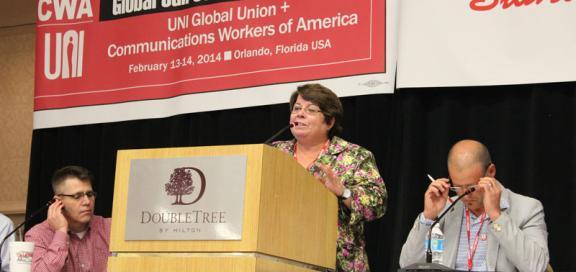Last week, UNI Global Union and the Communication Workers of America held a conference about how to improve working standards in call/customer service centres. The theme of the conference was “Raising Standards Globally”, in acknowledgment that only by working together can we push back against outsourcing and offshoring, and address problems with health and safety issues, lack of respect, unfair discipline, and pressure to reach ever more unrealistic targets.
The conference brought together customer service centre workers and union organizers from around the world to discuss ways to make improvements through bargaining, organizing, and international solidarity. MoveUP participated in the conference because our workers in customer service centres for Accenture at BC Hydro, ICBC, Coast Mountain Bus, and FortisBC face similar issues to call centre workers around the world.
CWA President Larry Cohen (right) set the tone for the conference in his opening remarks on the Thursday:
“For all call centre workers, from finance or telecoms and from global north or global south, all centre work is precarious. The difference between precarious and scary is not great. Whether it’s outsourced to another nation or outsourced across the street, every call center worker in every sector faces this precarious work. Scary work.”
UNI Deputy General Secretary Christy Hoffman echoed Cohen’s analysis of the situation facing call centre workers, and defined the goal of the conference: “We need a strategy that means respect for all of these workers: decent jobs and fair pay. “
Virginia Doellgast of the London School of Economics gave participants some background on what the research says about how unions can bring about better call centre jobs – jobs with decent pay, job security, limits on monitoring, more employee control over work pace and scheduling, and fair and reasonable targets.
She cited several academic studies that have shown unions are key to building these better call centre jobs: “Across the board I see unions making a big difference for wages and job security.” Doellgast said research shows employers will take the “low road” when they can, whether that means using temporary agency work, outsourcing or offshoring jobs, or moving work to subsidiaries.
“They [employers] need that push…of unions telling them you can’t dismiss the workers,” Doellgast stated.
Once you close off the “low-road”, Doellgast says employers are more willing to explore more positive, alternative models to achieve greater flexibility, productivity and performance in collaboration with workers and unions.
After Doellgast, delegates took the stage to talk about how their unions had raised standards in call centres through organizing.
Maria Xelhuantzi talked about the campaign to organize Atento workers in Mexico. Before organizing, workers were denied breaks even to drink water or go to the bathroom and some worked in poorly-ventilated buildings where the heat was unbearable.The union members put together a set of demands, including a wage increase, protections against abuse in the workplace, evacuation of workers during an emergency, and the creation of a joint occupational health and safety committee. The fight is not yet over. But Xelhuantzi says the presence of a union has led to significant improvements in working conditions and a significant decrease in attrition.
Next, Andy Kerr of the Communication Workers Union (UK) talked about organizing a new contact centre in Glasgow. The workers there moved to unionize because they felt they were being treated unfairly. Kerr said CWU built their reputation with the workers by focusing on defending people who were being disciplined for not meeting key performance indicators (KPIs). He said a big barrier to organizing in call centres is the high turnover, so by defending people against discipline they both slowed that process and helped people feel they had a future in that company.
“We have to focus in on the issues that are important to them…to listen to members in the workplace,” Kerr said.
Kerr encouraged unions to work together: “It doesn’t matter where you work…the problems facing call centre workers are the same…The performance issues are the same, how you’re treated is the same…and it’s something we should be able to unite on and build on.”
To end off Thursday, speakers talked about how to improve standards through bargaining and legislation.
Cenise Monteiro from Brazil (pictured at top) talked about how her union negotiated clauses in their collective agreement that gave workers shorter work days, training and transportation pay, limits on overtime, breaks for exercise or stretching, and defined acceptable temperatures for the workplace.
Monteiro said they still deal with challenges, including high rates of physical and mental stress and fatigue. They are currently rolling out a campaign and petition to support new legislation that would improve conditions for all call centre workers in Brazil.
Sandy Kmetyk (Communication Workers of America, pictured right) spoke next and shared her experience of how the union was able to help Verizon workers. She explained the situation when she started: “Digital technologies allowed our employers to monitor anything and everything we did…the focus shifted from service to sales.”
Kmetyk called the environment a “pressure cooker” and talked about how Verizon was constantly attempting to cut call times while forcing sales quotas higher and higher.
CWA decided to make stress relief in call centres a major focus for bargaining in 2000. They showed it could benefit the company too by reducing turnover and therefore training costs, and increasing customer satisfaction.
Under the collective agreement they reached, Pennsylvania call centre agents cannot be rated unsatisfactory or disciplined for not reaching a company’s sales objective. They also negotiated limits on how many calls Verizon could listen in on and evaluate (maximum 40 calls per year for anyone rated unsatisfactory).
Would give agents rated satisfactory advance notice before they listened in on your calls. Face-to-face feedback within a day after evaluation. Limited number of calls that could be evaluated based on your rating (max 40 calls per year for people unsatisfactory, down to 10 for exceeds).
Over the next decade, CWA extended those protections across the region through bargaining. They also added joint stress-relief committees, set limits on mandatory overtime, and got the employer to agree to adjust quotas when people have time off.
In 2011, Verizon came into bargaining with a concerted effort to turn back the clock on those gains. By mobilizing their membership and rallying the public, CWA was able to keep most of what they’d won, though they were forced to agree to recording of calls.
Kmetyk finished: “Our employers have gone global and so must we. Let’s build a global movement of call centre workers united to improve conditions for all of us.”



